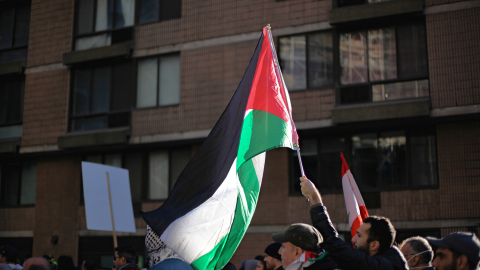I spent the first two weeks of the Hamas war in Jerusalem, with life punctuated by screaming air-raid sirens and the blessed booms of Iron Dome interceptions. Since then, back in Washington, D.C., I wish we had an Iron Dome device to shoot down the bad ideas and bogus phrases that play a crucial role in Hamas’s strategy to generate hatred of Israel, spark Arab and Muslim uprisings, derail Saudi Arabia’s normalization policy, and, ultimately, kill all of Hamas’s enemies (a category of which the Israelis are only a part). Let’s try to intercept a few of them.
Hamas knows it cannot defeat the Israeli army, so it fights an asymmetric war. It kills Israeli civilians and cruelly hides among Palestinian civiliansso that Israelis, in defending themselves, get blamed for unintentionally killing those unfortunate civilians. The war aim is not military. It is to influence public opinion around the world. The internet is a key front. News stories, ideas, memes, and words are essential.
When American journalists fall for Hamas tricks, it is hard to tell if they are gulls or confederates. The Wall Street Journal now points out that Hamas runs the Ministry of Health in Gaza. The New York Times now explains that the ministry is “part of the Hamas government.” But the Washington Post continues to cite that ministry for casualty information, at times without acknowledging that it is an arm of Hamas. Do Post reporters really think that a group that organizes mass rapes and the knifing of babies is credible in reporting about its enemies?
The war against Israel involves bizarre contortions of political terminology. Consider the terms “moderate” and “extremist.” The Palestinian Authority, which governs almost all the Arab residents of the West Bank and is reputed to be moderate, is backing Hamas in this war. The PA president denounces Israel for “aggression,” and the PA prime minister accuses Israel of “genocide” in Gaza. Having said America is “with Israel,” President Biden cannot be happy that these “moderates” are accusing him of supporting aggression and genocide. His enraged denunciations of the October 7 massacre suggest that it changed his views of Hamas. He now seems aware that the Palestinian extremists are even more extreme than he had previously understood. Perhaps he will see also that the Palestinian “moderates” are far less moderate than he understood. In every speech, President Biden pleads for a “two-state solution,” implying that Israel could achieve that goal if it wanted to. But what keeps such a peace out of reach are the extremism, hatred, and unwillingness to compromise of Palestinian leaders in the PA as well as Hamas. All of this should be easier to discern now than before October 7 — and it all warns against giving the PA control over Gaza after Hamas is destroyed. The Palestinians need new leaders altogether. Otherwise, there cannot be peace.
Palestinians also play word games with “occupation” and “occupied territories,” terms Westerners often understand as referring to the land Israel won in the 1967 Arab–Israel war: the Golan Heights, the West Bank, and Gaza. That makes the Palestinian cause seem moderate — all it wants are those small territories. But the ubiquitous slogan “from the river to the sea” — the theme of the thousands-strong November 4 pro-Palestinian demonstration near the White House over the weekend — gives the game away. No Palestinian leader has ever said that the “occupation” began only in 1967. If asked, Palestinians explain that it began in 1948, when Israel was born. That makes the whole country “occupied territory.” Ending the occupation means ending Israel. But Westerners — officials, reporters, and others — rarely ask.
Likewise rarely asked is whether Palestinian expressions of non-violence actually mean what they say. Palestinian schools and community centers win Western funding by claiming to oppose violence. The Alrowwad community center in Bethlehem’s Aida refugee camp, for example, promotes “beautiful resistance,” and the director’s office displays pictures of Gandhi and Martin Luther King. Does this signify opposition to anti-Israel terrorism? No, the director explained. Why? Because “the occupation” is violence, and Arab resistance to it is not violence, but self-defense, an inalienable right. So, terrorism isn’t terrorism; it’s not even violence. And Israel is violent simply by occupying space.
Similar word games are played with the term “refugee.” Take Gaza’s Jabaliya “refugee camp.” The astute Bret Baier of Fox News wondered aloud why it is called a refugee camp, as it is full of permanent structures. Good question. The answer is that the United Nations defines “refugee” differently for Palestinian Arabs than for anyone else. There is one U.N. refugee office for Palestinians (UNRWA) and one for the rest of the world (UNHCR). Displaced people who are not Palestinian Arabs are refugees only until they find a place to live for an extended time, which is usually within a year or two, maybe three. According to UNRWA, however, Palestinian Arabs from Israeli-controlled land remain refugees for their whole lives, and their children, grandchildren, great-grandchildren, and so on also qualify as refugees. By that definition, Tel Aviv is a refugee camp. New York too, for that matter. And London and Paris.
One of the most potent verbal missiles fired at Israel by its enemies is the accusation that it is “colonialist.” This is an especially gross case of the fraudulent manipulating the stupid. Colonialists staked claims on behalf of their imperialist motherlands. Think of the British in India or the French in their African colonies. After Zionists began urging a “return” to Zion in the late 19th century, the typical Jew who came to build a Jewish-majority state arrived as a refugee, with little to no money. He staked no claim for the country he came from and thought of that country as anti-Jewish and oppressive, by no means his motherland. He saw Palestine, which he called the Land of Israel, as his motherland. Jews are indigenous there. Arabs also think of themselves as indigenous, though it was relatively recently (in A.D. 7th century) that they colonized Palestine on behalf of the Arab Empire founded by the Prophet Muhammed. Since then, whenever Arabs or Muslims controlled Palestine, the land was a colonial province of a non-Palestinian empire based in Baghdad, Damascus, Cairo, or Istanbul. Who, then, are the colonialists?
And now, Israel is being pressed to make “humanitarian pauses” to ensure that food and other supplies make it into Gaza. Is there another case in the annals of the human race when a country at war was duty-bound to sustain a population under enemy control before the enemy surrendered? Wars have often been decided by which side most effectively cuts supplies to the other side. That was how the Allies won the First World War. Remarkably, when Germany surrendered unconditionally in 1918, there was not a single Allied soldier on German soil. The Allies won not by taking Germany over, but by preventing supplies from getting in. If a foreign diplomat had told British leaders that they had a humanitarian duty to feed the Germans before they surrendered, he would have been dismissed as clueless, if not crazy. Even so, Israel is allowing massive quantities of humanitarian aid into Gaza, though there seems to be wall-to-wall opposition in Israel to any kind of cease-fire, even one that is labeled a “pause.”
The promoters of pauses also commonly express fear that Islamophobia is surging in the West. The warning is better received if it comes from principled opponents of bigotry. But Hamas supporters denounce anti-Muslim bigotry while championing obliteration of the Jews. In any event, is there anything thatgenerates hostility toward Islam and Muslims more than committing mass rape, burning live people, and butchering babies, at the hands of people who proclaim that they are acting in the name of Islam? Nothing will help the fight against Islamophobia more than the destruction of Hamas.
Let’s end on a hopeful note. People naturally wonder what will come after this round of war ends. The nothing-gets-accomplished-by-violence school arguesthat, no matter how many Hamas members Israel kills, other Palestinians will replace them, and in any event Hamas’s ideas can’t be killed. But that’s not necessarily true. Hitler’s defeat effectively ended Nazism in Germany (at least it has for nearly 80 years). Likewise, when the Tokyo military regime was destroyed, its extremist ideology went with it. And though Marxism-Leninism is still alive in China, the USSR’s demise buried that ideology in Russia and the other former Soviet states. Ideas, as a practical political matter, can actually be killed and buried, perhaps never to be resurrected. Another example, closer to home: The American South’s pro-slavery ideology died with the Confederacy and never came back. Ideological movements tend not to regenerate after they spawn wars in which they are devastatingly defeated. This is an optimistic thought for Gaza.
As Israel defeats Hamas — despite the terrorists’ rockets, jihadist ideology, and dishonest propaganda — Gazans have an opportunity to rise up and create a better government, not run by murderous ideological extremists. “Free Palestine” could be reinterpreted to mean that the Arabs there should be freed from the corrupt tyranny of their own bad leadership. Palestinian leaders actually interested in improving the life of their people would treat Israel as a partner, not an enemy.

















